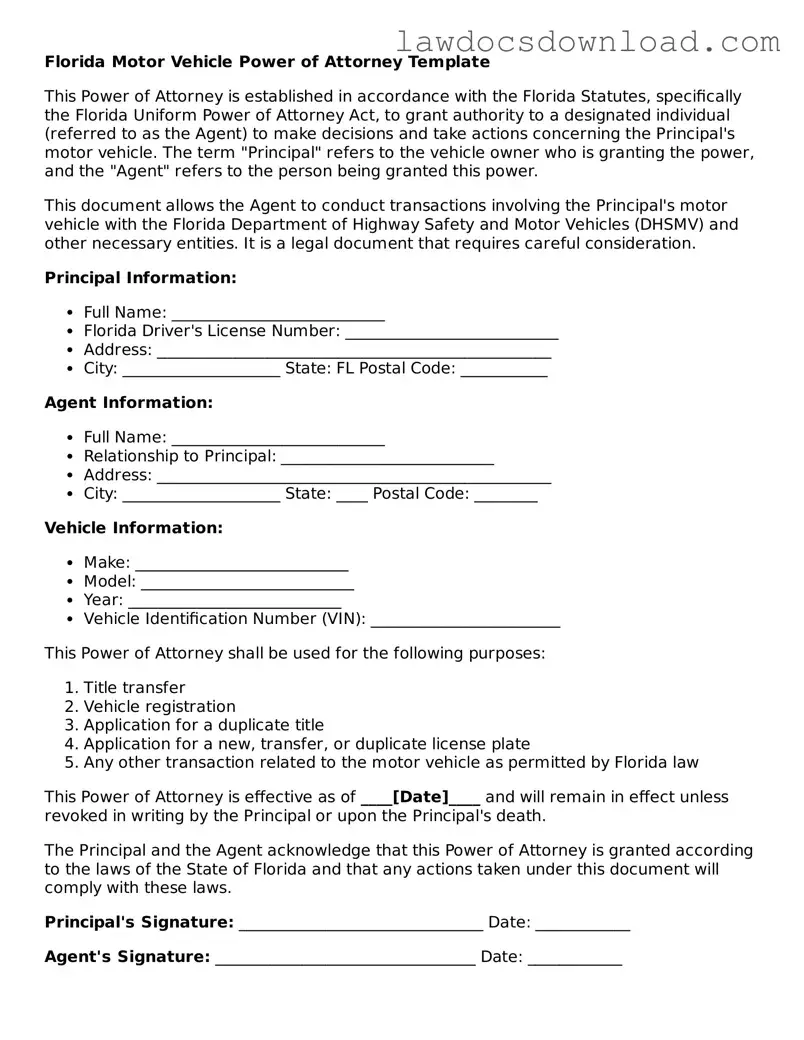The Florida Motor Vehicle Power of Attorney form shares similarities with the General Power of Attorney document primarily through its capacity to grant authority to another person. In the General Power of Attorney, an individual (the principal) authorizes another (the agent) to make a wide range of decisions on their behalf. This can include financial, legal, and personal matters. The Motor Vehicle Power of Attorney, however, is more specific, conferring authority only in matters related to the ownership, operation, or management of one or more vehicles.
Similar to the Durable Power of Attorney, the Florida Motor Vehicle Power of Attorney delegates authority to an agent, but the scope is limited strictly to vehicular matters. The key difference lies in the durability; a Durable Power of Attorney remains effective even if the principal becomes incapacitated. This feature is not inherent to the Motor Vehicle Power of Attorney, which does not typically include stipulations regarding the principal's health or capacity.
The Medical Power of Attorney form is another document that bears resemblance to the Motor Vehicle Power of Attorney insofar as it allows an individual to appoint an agent. The agent in a Medical Power of Attorney is empowered to make healthcare decisions on the principal's behalf when they are unable to do so. While both forms delegate authority, the areas in which the agent can operate are vastly different, focusing on health-related decisions in one and motor vehicle matters in the other.
Like the Limited Power of Attorney, the Motor Vehicle Power of Attorney form gives an agent power in a specific context or for a particular task. Both documents restrict the agent's authority to clearly defined situations or transactions. For the Motor Vehicle Power of Attorney, the focus is exclusively on tasks related to motor vehicles, such as registration or sale, whereas a Limited Power of Attorney could be limited to almost any kind of task or transaction, not necessarily related to vehicles.
The Springing Power of Attorney and the Florida Motor Vehicle Power of Attorney are akin in their conditional nature. A Springing Power of Attorney becomes effective under circumstances specified in the document, often the principal's incapacitation. Although the Motor Vehicle Power of Attorney doesn't typically operate on a conditional triggering event, it's narrowly tailored in scope, applying only to vehicle-related matters.
Both the Real Estate Power of Attorney and the Motor Vehicle Power of Attorney forms allow an individual to appoint an agent to handle their affairs within specific domains. For the Real Estate Power of Attorney, this domain is the buying, selling, management, or refinancing of property. It's similar to how the Motor Vehicle Power of Attorney provides an agent with authority over vehicular transactions but does not cross into real estate matters.
The Financial Power of Attorney bears similarity to the Motor Vehicle Power of Attorney by enabling an individual to designate an agent to act on their behalf in financial affairs. While the Financial Power of Attorney encompasses a broad range of financial decisions and transactions, the Motor Vehicle Power of Attorney is strictly limited to financial decisions regarding vehicles, such as those related to purchase, sale, or registration.
Comparable to the Motor Vehicle Power of Attorney, the Child Care Power of Attorney grants authority to an agent to make decisions in a specific area, which in this case, is the care and supervision of the principal's child(ren). While both forms indeed delegate decision-making authority, they diverge significantly in their focus areas - child care versus vehicular affairs.
The Tax Power of Attorney, similar to the Florida Motor Vehicle Power of Attorney, authorizes an individual to represent the principal in dealings within a confined area, specifically tax matters. Unlike the broader authority granted by a General Power of Attorney, both of these forms tailor the agent's power to very particular domains - tax-related issues for the Tax Power of Attorney and motor vehicle matters for the Motor Vehicle Power of Attorney.

